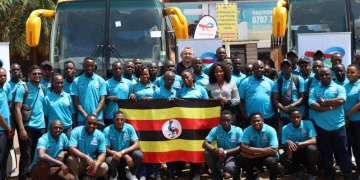Uganda ‘s education system, like in any other sub-Saharan African country, has continued to face immeasurable challenges such as youth unemployment; being the biggest blow, majorly resulting from the mismatch between what graduates the universities and tertiary institutions churn out and what skills the current job market actually needs.
While appearing on NBS Television on May 3, at a panel of key note speakers on Covid-19 and the economy; on the theme ‘Inclusive economic stimulus strategies, opportunities and linkages’; an e-conference organised by the Public Sector Foundation of Uganda (PSFU), Ms Victoria Sekitoleko (vice chair of PSFU), echoed and amplified the urgent need for Uganda’s policy makers to restructure the current education system, an idea that was propounded by Prof Waswa Balunywa, a fellow panelist.
On post Covid-19 and the future of education in Uganda, Prof Balunywa besides imploring the government to take a leap and embrace technological advancements currently shaping the world’s economy; e-commerce, e-government and e-learning, among others, he stressed the dire need for restructuring the education system by extending teaching of technical studies and sciences to lower primary levels throughout upper primary levels to secondary schools to boost skills and knowledge of the learners.
Prof Balunywa recommended setting up of technical or vocational universities across the country.
Uganda can learn from countries like Malaysia, Taiwan, Singapore, China, South Korea and Indonesia; which invested heavily in their human resource by sending their nationals to the Western world’s best schools to acquire skills and knowledge in science, medicine, engineering and technology.
These interventions significantly boosted those nations’ human capital that was later instrumental in building of their vibrant economies in early 1950s.
Following Prof Balunywa’s proposed model, it is never too late for the government of Uganda to invest heavily in technical schools from the grassroot by attracting highly qualified teachers and instructors in all science and technology fields across the globe, pay them internationally competitive market rates, retool and train Uganda’s new breed of generation in agricultural mechanisation, science, medicine, engineering, technology, oil and gas, among others.
Looking at a trajectory of 20 to30 years from now, Uganda shall authoritatively position herself as a hub of excellence in terms of most highly skilled labour force on the African continent. It will be this breed of highly trained generation that will train other coming generations who shall build Uganda and Africa to the most sought after middle class that shall later metamorphose into first class world’s economies as we are witnessing today with China and other economies.
With the political will of the existing leadership and all the stakeholders joining hands together, the same way Ugandans have done in the protracted fight against the coronavirus pandemic; we can all contribute “etoffali” towards building a Uganda and Africa at large that our children and children’s children shall be proud of.
Sectors such as manufacturing, technology, mechanisation of agriculture, mining and oil exploration shall be managed by our own highly skilled citizens and the soaring unemployment shall be harmonised.
In addition, such reinvigorated approaches shall bring into context the much-hyped concepts such as ‘Buy Uganda Build Uganda’ .
Ultimately, Uganda belongs to all of us and together we can make a difference towards building a nation that we shall all be proud of and the legacy of all the change agents and leaders at all levels.
Rodgers Byamukama, r.byamukama97@gmail.com











Discussion about this post